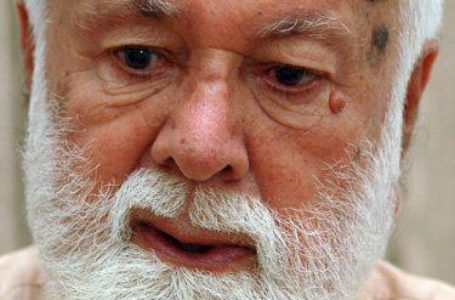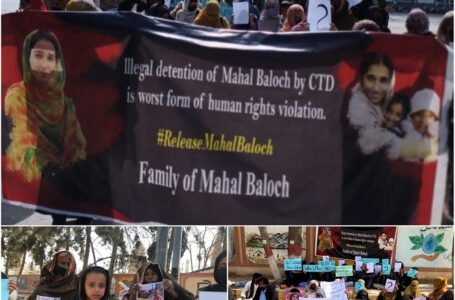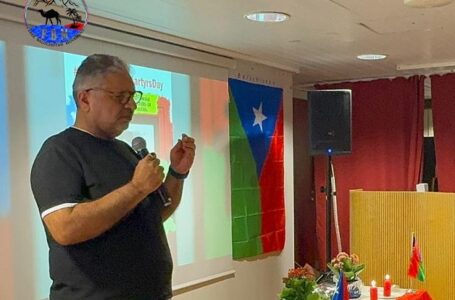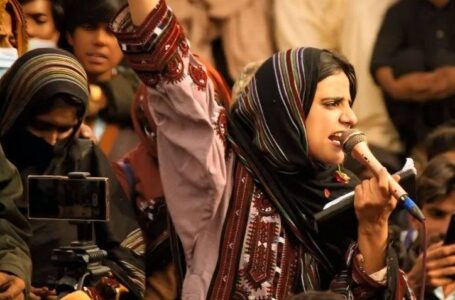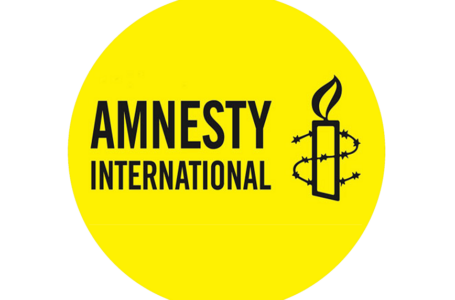Occupied Balochistan: A Chronicle of Genocide, Exploitation, and Resistance
Khair Bakhsh Marri
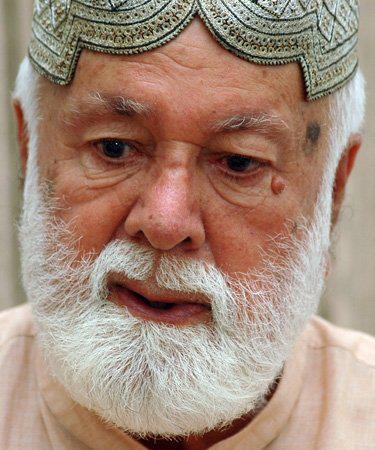
Afrasiab Khattak
Because of my father Mohammad Ayub Khan’s involvement in Pashtun nationalist movement I had not only heard about Bacha Khan and other leaders of the movement from my childhood but I had seen Bacha Khan when I was a kid. But I came to know about the broader progressive democratic organizations and personalities after 1968 when I got politicized in the great people’s uprising against the dictatorship of General Ayub Khan.
In the general elections of 1970 my organization, Pashtun Students Federation supported National Awami Party (NAP), a party of progressive and nationalist political forces with a strong base in Pakhtunkhwa and Balochistan. It was at this stage that I came to know about the main leaders of the Party. Khair Bakhsh Marri (or KB as his close friends called him) emerged as one of the top leaders of the party in Balochistan. To many, this powerful chieftain or Nawab of Marri Baloch tribe with an impressive personality remained a mystery as despite being a member of an established socio-political elite he maintained a consistent and active interest in theory and practice of Marxism. He also gradually came to be known for his straight talk on the national question. Like many young activists I also developed interest in knowing about his ideas. I followed his speeches in public meetings and media.
In January 1972 when Z A Bhutto took over power after the disintegration of Pakistan in December 1971, he lifted the ban on NAP that was imposed on the party by General Yahya Khan during the crises in 1971. Bhutto also invited the party to join the government as NAP had emerged as the largest party in Balochistan and Pakhtunkhwa in the general election of 1970. Abdul Wali Khan, President of the Party convened a meeting of the central leadership in Greens Hotel Peshawar to discuss the emerging political situation and prepare a strategy for the future.
Khair Bakhsh Marri along with Ghous Bakhsh Bezjinjo and Attaullah Mengal came to participate in the meeting. Ajmal Khattak introduced me to Khair Bakhsh Marri and it was on this occasion that we had detailed discussion on 1971 crises leading to the disintegration of Pakistan and the shape of things to come in the ‘new Pakistan ‘ as Z A Bhutto used to call the remaining country. This was the beginning of a personal and political relationship that remained intact for decades to come during our political struggle including the time that we spent together in prisons and exile.
The Peshawar meeting of NAP leadership ( January 1972) held at the Green Hotel Peshawar Cant became a small public gathering as many party workers arrived at the venue and joined the proceedings. I also attended the meeting. Most of the Pashtun speakers were welcoming Z A Bhutto’s decision to lift the ban on NAP and were in favour of joining the government with the PPP. But the scene changed when Khair Bakhsh started speaking. He questioned the concept of ‘New Pakistan’ propounded by Mr Bhutto in his first speech after taking power.
Khair Bakhsh Marri said what is new about the state which is clinging to the same old exploitative system? He opined that its old wine in a new bottle and it shouldn’t deceive us. He said the hand of so-called friendship being extended to us has the blood of Bengalis on it. The massacre in Bengal is too fresh to be forgotten. He said what’s the guarantee that the same hand will not shed our (Baloch/Pashtun) blood? Khair Bakhsh suggested that we should first demand our national rights before we decide on joining the government. Wali Khan who spoke at the end appointed the three Baloch leaders (Bezinjo, Mengal and Marri) to meet Bhutto and present NAP’s viewpoint to him.
After getting the report of the aforementioned NAP meeting Bhutto appointed PPP’s Hayat Mohammad Sherpao and Ghous Bakhsh Raisani as governors of Pakhtunkhwa and Balochistan for putting pressure on NAP. In April 1972 when NAP’s negotiations with the ruling PPP succeeded and the party formed government in Balochistan and Pakhtunkhwa, Khair Bakhsh as provincial president of NAP in Balochistan always insisted on taking a firm ideological position on political issues.
In February 1973 Prime Minister ZA Bhutto, after a visit to Iran, suddenly dismissed the elected provincial government of Balochistan. The unconstitutional dismissal of the NAP’s provincial government that enjoyed the support of the majority of members in the provincial assembly of Balochistan created unrest and anger among the Baloch nationalists and some of them decided to launch an armed struggle. Pakistan army launched a large scale military operation involving thousands of troops. Reza Shah, the King of Iran sent helicopters to help Pakistan army. The federal government lost no time in arresting the senior Baloch leaders. In February 1975 NAP was banned and in March 1976, 55 leaders and activists were arraigned before a special tribunal for a trail of high treason in Hyderabad.
I was also one of the accused persons and spent time with others. Left-leaning activists and leaders used to hold study circles in the prison for studying Marxism. Khair Bakhsh was a key figure in the study circle. Some of us would question his defence of tribal militancy and the armed struggle but he would defend his political/ideological positions with patience and composure through detailed arguments. During the trial (which was held inside a hall in the prison) leaders like Wali Khan, Ghous Bakhsh Bezinjo, Arbab Sikandar Khan and others used to address the court but Khair Bakhsh would sit quietly among the young activists on the backbenches. I remember an interesting anecdote from those days.
Our lead lawyer Mian Mehmood Ali Qasuri used to shake hands with each one of his clients when he would come for the trail after the interval of a few months. While doing so he came to the backbenches and reached with some difficult to shake the hand of Khair Bakhsh who was sitting in a corner. After shaking Khair Bakhsh’s hand Mian Qasuri exclaimed, “KB you sit in such far corners that it isn’t easy to reach you for shaking your hand.” Khair Bakhsh smilingly retorted, “but Mian Sahib, Punjabis have long hands and they can reach anywhere they want.” Everyone had a hearty laugh. During the entire Hyderabad case, he spoke only once when he was called by the judges for plea recording. He said, “please don’t waste our time and your own time by telling us that the court is neutral. You are part of the system and you are paid to defend the status quo”.
At this Justice, Abdul Hakim interrupted his speech and told him that the court is dealing only with legal aspects of the case and it has nothing to do with its political aspects. Khair Bakhsh said, “you can’t bifurcate legal from political. It is a case against those who have challenged the exploitative system. The so-called legal is a camouflage for political. I don’t expect it to be a fair trial. That’s why I didn’t speak here in the past. Today you invited me to speak so please bear with me. Have a heart. Bhutto will not punish you for listening to me. This is a case which will be decided by our people and by history.
“It’s not the first such case. Chiang Kai Shek in China alleged Mao Tse Tung of launching a mutiny but historical experience proved that it was a revolutionary process that led to the formation of a new China. Similarly, dictator Batista in Cuba charged Fidel Castro and his companions of sedition but all of us know that the popular uprising led to the emancipation of the Cuban people. So taking decisions in such cases is beyond the capacity of the courts defending status quo”. Khair Bakhsh spoke for about half an hour and he was heard in pin-drop silence. General Zia overthrew Z A Bhutto’s government on July 5, 1977. After a few months, he visited Hyderabad Jail to meet NAP leaders.
He invited Wali Khan, Ghous Bakhsh Bezinjo Attaullah Mengal and Khair Bakhsh Marri to the office of Jail superintendent one by one and talked to them. With each of the first three leaders, he spent half an hour in assuring that it was Bhutto who had dismissed their provincial government in Balochistan and put them behind the bars but he is going to change that policy. He hoped that they will play an important role in Islamic and democratic Pakistan.
But he couldn’t say all this to Khair Bakhsh who was wearing a big and prominent Lenin badge on his hand-woven cotton shirt. Their meeting continued only for 2/3 minutes in which Zia asked the health and well being of Khair Bakhsh and the later told him that he was fine. Zia couldn’t dare invite him to the politics of his “Islamic & Democratic” Pakistan.
After spending more than two years in prison under Zia for opposing his martial law I went to Afghanistan in August 1980 in self-exile. Khair Bakhsh Marri also arrived there after some time and we lived together in Kabul for long years. Some 15000 Marris joined him in his life in exile. They hoped to start a struggle for an independent Balochistan from Afghanistan. Khair Bakhsh Marri spent a lot of time in training political cadres among his followers. He also read a lot of books that broadened his vision about the future of his people. But neither the Soviet Union nor the Afghan government, despite their respect for the legendary Baloch nationalist leader were ready to host a militant struggle for Baloch independence.
Quite contrary to the political fiction propagated by the western ideologues and Zia’s military dictatorship in the 1980s the Soviets didn’t have any plan to expand towards the warm waters. But Khair Bakhsh, a man with an iron will and strong nerves remained strongly committed to the idea of an independent Balochistan. He wasn’t the type of political leader who would be either encouraged or discouraged over the foreign support or the lack of it for his cause. He remained steadfast until the very end.
Afrasiab Khattak is a retired Senator and an analyst of regional affairs.
Source: Daily Balochistan Express

